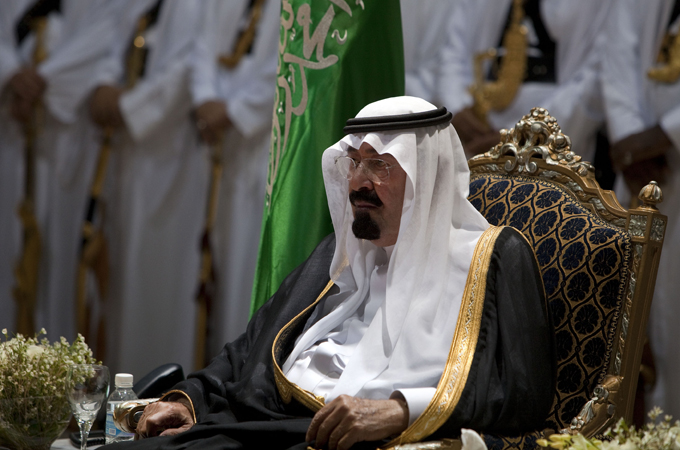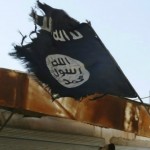by Thomas W. Lippman
When Ramadan arrives in mid-summer, as it did this year, it usually guarantees that nothing of significance will happen in Saudi Arabia. The days of fasting are long, the heat is intense, and everybody who is anybody gets away to some place more comfortable. This Ramadan could be different, however, because Saudi Arabia is suddenly surrounded by trouble and could be forced to take some strong actions — if its rulers could figure out what actions to take.
The Saudis are not only concerned about Syria — where the regime of President Bashar al-Assad, whom the Saudis have vowed to oust — appears to be gaining strength. Nor Iraq, where the religious extremists who call themselves the Islamic State of Iraq and Syria (ISIS) present what Riyadh sees as a direct threat.
Now there is also Gaza, where Israel is attacking the militant group Hamas, which has been sending rockets into southern Israel. Television news is full of images of Palestinian women and children grieving in the rubble of bombed buildings. It is always painful for King Abdullah to see the plight of the Palestinians, and he deplores any conflict that pits Arab against Arab, but there is not much he can do about the latest round of violence except plead with the United States to restrain the Israelis. In past conflicts between Hamas and Israel, Egypt has stepped in to broker a cease-fire; this time there is no sign of any such intervention. The Saudis have been strong supporters of Egypt’s new president, Abdel Fattah al-Sisi, but he has his hands full consolidating his power and trying to restore order in the Sinai. Sisi may be more concerned about instability on his other border, in Libya.
Even closer to home for the Saudis is the escalating conflict in Yemen, an always-troublesome and impoverished neighbor to the South. This week a Shia rebel group known as the Houthis, which Saudi Arabia says is backed by its arch-rival Iran, seized control of an important town in the northern part of the country and is ratcheting up its long-running struggle against the government in Sana’a. The Saudis intervened in that conflict in 2009, taking military action against Houthis along the border, but their efforts were largely fruitless and are unlikely to be repeated. Yemen also faces a secessionist insurgency in the South.
If the Sana’a government is unable to restore stability in the North, Saudi Arabia could face an influx of refugees as well as infiltration by potential terrorists based in Yemen. Last week six militants attacked a Saudi border post, killing five security officers. The Saudi government said the six were Saudi nationals, not Yemenis, but that is small comfort. Yemen is full of Saudi jihadists looking for opportunities to cross the border and strike at the kingdom.
It is possible that the Saudis are looking at two failed states materializing on their borders simultaneously in Yemen, and Iraq where the Saudis face a choice between undesirable and potentially threatening outcomes.
Saudi Arabia’s rulers never reveal much about their deliberations, but based on comments from public officials and input from regional analysts, it is relatively easy to discern their multiple dilemmas in Iraq.
The country is fragmented along ethnic and sectarian lines and could disintegrate. The Saudis have no interest in helping Iraq’s beleaguered Shia prime minister, Nouri al-Maliki, gain a third term in the current parliamentary maneuvering, because King Abdullah loathes him and the Saudis regard him as an agent of Iran who brought the crisis on himself. But the chief threat to the Baghdad government is also a threat to Saudi Arabia: ISIS, the Islamic State, the militant Sunni Muslim group that has seized control of much of northern Iraq. That group is an ideological clone of al-Qaeda, whose first target has been a Saudi monarchy that they regard as a corrupt cat’s paw of the West. In late June, Abdullah ordered Saudi security forces to do whatever was necessary to defend the Kingdom against any threat from the north.
The leader of the Islamic State, who calls himself Abu Bakr al-Baghdadi, taunted Saudi Arabia by proclaiming his expanding domain a “caliphate,” a transnational Islamic society run according to strict Islamic rule, as its followers imagine the early Muslim community was run by the “rightly-guided” caliphs, successors to the terrestrial power of the Prophet Muhammad. The title was held for centuries by the Ottoman emperor in Istanbul but few Muslims outside the empire paid much attention and the position was abolished when that empire broke up after World War I. Restoration of the office, with real power, is a stated goal of many Jihadist groups.
The Saudis, stewards of the holy cities of Mecca and Medina and of the annual Muslim pilgrimage, cannot permit any Sunni Muslim upstart to claim supremacy in the faith, but that is what al-Baghdadi — claiming descent from the Prophet — is doing. As Bruce Riedel, a longtime US intelligence analyst, wrote recently in Al-Monitor, “The proclamation of a caliphate and a caliph is a monumental act of hubris. Neither Osama bin Laden nor Abu Musab Zarqawi, Baghdadi’s heroes, ever proclaimed creation of a caliphate and preferred the more cautious title of emir. For the Saudis the proclamation is tantamount to a declaration of war.”
How is that war to be fought?
The Wall Street Journal reported this week that the Saudis are “cultivating” friendly Iraqi tribes who are Sunni Muslims opposed to the extremists, as the United States did during its war there. But Bernard Haykel and Cole Bunzel of Princeton University say that al-Baghdadi has managed to strike numerous deals of his own with the Sunni tribes, “without whom he could not have conquered so much territory so quickly.” Even if the Journal is correct, Saudi support for the tribes is likely to be more political and economic than military because the Saudis are in no position to intervene directly against the Islamic state. The war zone is far away across the desert, and entering the fight at this point would represent de facto support of Maliki.
Under the old Middle East bromide that “the enemy of my enemy is my friend,” some analysts have suggested it may be time for Saudi Arabia and Iran to form at least a temporary partnership to confront the Islamic State. That might make sense if ISIS were the only issue, but that’s not the case for Riyadh. Iran is also the main supporter of Assad in Syria, and in Riyadh’s view is a troublemaker that needs to be curtailed, not encouraged.
So there are no obvious or easy choices for Saudi Arabia’s decision-makers. Wherever they are spending this overheated holy month, there must be some intense conversations over their iftars.






By the reasoning here, it should be clear that the U.S. hasn’t any business in the M.E., the Military, that is. This whole business seems to revolve around religious beliefs, of which the U.S. hasn’t the foggiest idea of what to do, beside bomb, kill, maim, essentially the civilian population. Perhaps a better solution for the U.S., would be to send everyone who drinks that brand of koolaid, over to the M.E., that way, they might see just what they have done? Of course, that will never happen, for they will all yell the Cheney mantra of having more important things to do then stand up for his country.
The Saudis may be about to reap what they have sown…. Wahhabism and Salafist doctrines exported all over the Muslim world will come back to haunt them. We should get cracking with fracking and any other means to accelerate our energy self-sufficiency – or at least our independence from Mideast sources.
I agree with Daniel Martin: the Saud gangsters are being hoist by their own petard.
They (at the initiation of bin Sultan) set this whole situation off by funding the arming of Syrian rebels in league with the US, EU countries, Turkey, Jordan and Israel – and now the whole lot of them are suprised to find out they have set off a chain reaction they cannot control.
Other more focused groups and individuals (IS) have appropriated the weapons systems the coalition of the stupid (led by the US) placed in the hands of “moderate” oppositionists in Syria.
The Islamic State knows what it wants and it has nothing whatsoever to do with the foreign policy interests of the USA, EU, Israel, Turkey, Jordan, Saud gangsters or anyone else.
They say what they mean and they mean what they say.
The days of “spin” by lick-spittle local elites are over.
We should realise this is a wholly new era.
These people are truly different.